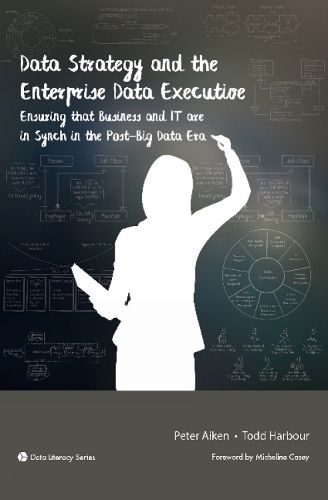Readings Newsletter
Become a Readings Member to make your shopping experience even easier.
Sign in or sign up for free!
You’re not far away from qualifying for FREE standard shipping within Australia
You’ve qualified for FREE standard shipping within Australia
The cart is loading…






This title is printed to order. This book may have been self-published. If so, we cannot guarantee the quality of the content. In the main most books will have gone through the editing process however some may not. We therefore suggest that you be aware of this before ordering this book. If in doubt check either the author or publisher’s details as we are unable to accept any returns unless they are faulty. Please contact us if you have any questions.
Pervasive, data is a unique organisational resource, and this distinction warrants its own strategy. Data, representing your single non-depletable, non-degradable, durable strategic asset, is likely also your most poorly leveraged and underutilised organisational asset. Lack of talent, barriers in organisational thinking, and seven specific data sins prevent most organisations from benefiting fully from their data asset investments. Solving these prerequisites will allow your organisation to: Improve your organisations data; Improve the way your people use data; and Improve the way your people use data to achieve your organisational strategy. This method better focuses data and thinking in direct support of strategic objectives. After eliminating necessary prerequisites, organisations can develop a disciplined and repeatable means of improving their data, literacy, standards, and controls using data governance practices. Once in place, the process (based on the theory of constraints) becomes a variant of lather, rinse, and repeat. Several complementary concepts covered include: An overview of data strategy prerequisites; A repeatable process for identifying and removing data constraints; Why data strategy is necessary for effective data governance; Balancing operational results with capability development; An objective definition of data-centric thinking; and Ways to monetise these efforts.
$9.00 standard shipping within Australia
FREE standard shipping within Australia for orders over $100.00
Express & International shipping calculated at checkout
This title is printed to order. This book may have been self-published. If so, we cannot guarantee the quality of the content. In the main most books will have gone through the editing process however some may not. We therefore suggest that you be aware of this before ordering this book. If in doubt check either the author or publisher’s details as we are unable to accept any returns unless they are faulty. Please contact us if you have any questions.
Pervasive, data is a unique organisational resource, and this distinction warrants its own strategy. Data, representing your single non-depletable, non-degradable, durable strategic asset, is likely also your most poorly leveraged and underutilised organisational asset. Lack of talent, barriers in organisational thinking, and seven specific data sins prevent most organisations from benefiting fully from their data asset investments. Solving these prerequisites will allow your organisation to: Improve your organisations data; Improve the way your people use data; and Improve the way your people use data to achieve your organisational strategy. This method better focuses data and thinking in direct support of strategic objectives. After eliminating necessary prerequisites, organisations can develop a disciplined and repeatable means of improving their data, literacy, standards, and controls using data governance practices. Once in place, the process (based on the theory of constraints) becomes a variant of lather, rinse, and repeat. Several complementary concepts covered include: An overview of data strategy prerequisites; A repeatable process for identifying and removing data constraints; Why data strategy is necessary for effective data governance; Balancing operational results with capability development; An objective definition of data-centric thinking; and Ways to monetise these efforts.